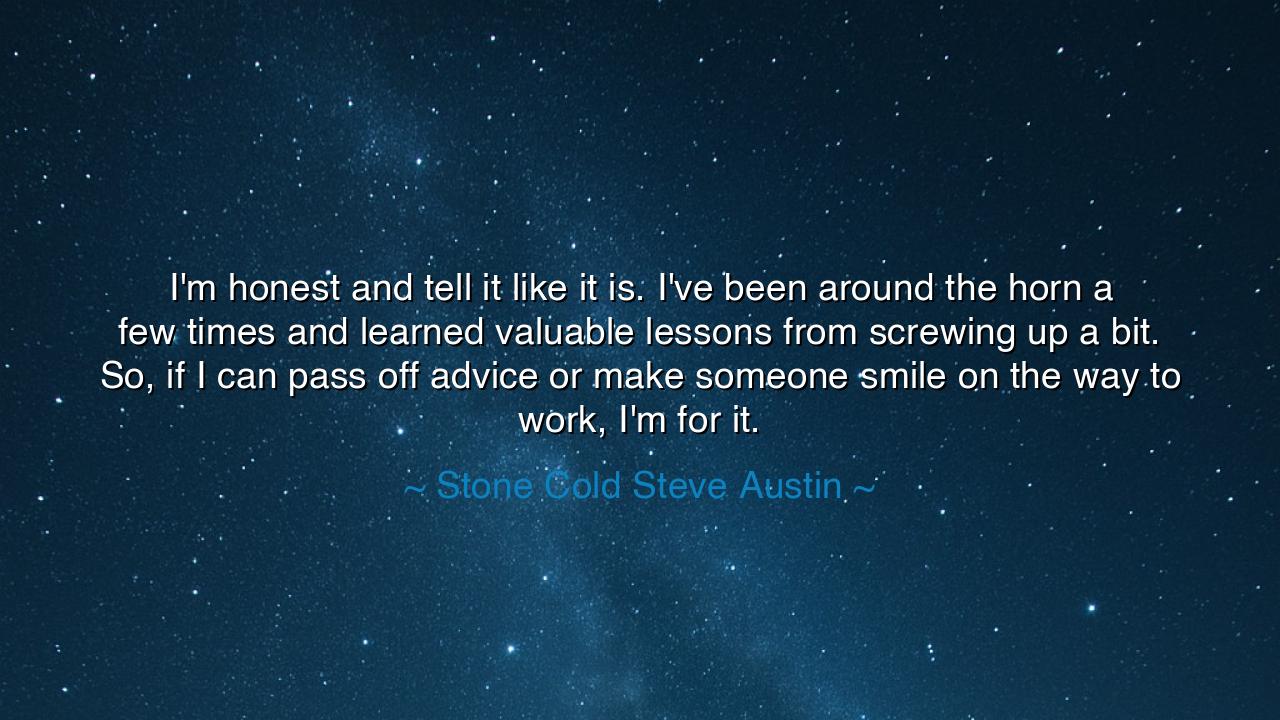
I'm honest and tell it like it is. I've been around the horn a
I'm honest and tell it like it is. I've been around the horn a few times and learned valuable lessons from screwing up a bit. So, if I can pass off advice or make someone smile on the way to work, I'm for it.






The words of Stone Cold Steve Austin strike like a hammer upon the anvil of truth: “I’m honest and tell it like it is. I’ve been around the horn a few times and learned valuable lessons from screwing up a bit. So, if I can pass off advice or make someone smile on the way to work, I’m for it.” Within these words is not the voice of arrogance but of humility, forged through failure, tempered by experience, and refined into a gift for others. It is the ancient truth that wisdom does not come from perfection but from the scars we carry.
To be honest and “tell it like it is” is a virtue known and praised by the sages. For in every age, men and women have been tempted to flatter, to twist words, to soften truth for gain. But Austin speaks of the hard road: the choice to speak plainly, even when it stings, even when it reveals one’s own weakness. This is the way of the warrior-philosopher, who holds truth higher than comfort. It is a dangerous road, for honesty often offends, but it is also the only road that leads to respect.
He admits, too, to screwing up—a phrase simple but profound. Here is the humility that every true teacher must possess. For one who pretends to be flawless cannot truly guide others. Only the one who has stumbled knows where the stones are hidden. Only the one who has fallen can point out the pit. Austin’s confession echoes the wisdom of the ancients: Socrates himself declared that wisdom begins with the knowledge of one’s own ignorance. To acknowledge mistakes is not weakness, but strength, for it turns failure into lessons.
Consider the life of Abraham Lincoln. Before becoming president, he failed in business, lost elections, and endured deep personal sorrow. These failures, rather than destroying him, became his teachers. When at last he rose to lead a nation divided by war, he carried not the pride of a flawless victor, but the humility of a man tested by hardship. His speeches, filled with plain truth and deep humanity, reflect the same spirit Austin describes: mistakes endured, lessons learned, wisdom passed on.
Austin’s words also turn toward generosity. He says, “If I can pass off advice or make someone smile on the way to work, I’m for it.” Here lies the heart of his philosophy: that our struggles are not meant to end with us. The knowledge we gain through pain becomes a light for others, and the humor we share becomes a balm. Even the smallest act—lifting a weary soul with a joke or offering one word of counsel—becomes a noble deed. It is a reminder that greatness lies not only in victory but in service, in leaving behind more joy and wisdom than we take.
The deeper meaning of this quote is that every life, no matter how scarred or battered, holds treasure. Our failures are not to be hidden in shame, but to be transformed into guidance for others. Our honesty is not a weapon to wound, but a gift to awaken. Our laughter is not frivolity, but medicine for the heavy-hearted. Austin teaches that the true hero is not the one who never fell, but the one who rises and then stretches out a hand for others.
The lesson for us, then, is clear: Live with honesty, admit your failures, learn from them, and share those lessons generously. Do not hoard your wisdom or hide your scars. Instead, let them become the stories, the jokes, the words of advice that lighten the path for another. And above all, seek to leave behind smiles—for if someone steps into their day lighter because of you, then your life has already achieved something eternal.
Thus, the words of Stone Cold Steve Austin become not merely a wrestler’s reflection but a timeless teaching: that honesty, humility, and humor are greater than pride and perfection. In truth-telling, in learning from failure, in sharing laughter, one becomes not only stronger but also a beacon to others. This is the wisdom of the ancients, reborn in modern speech: stumble, rise, and then teach others how to walk.






AAdministratorAdministrator
Welcome, honored guests. Please leave a comment, we will respond soon